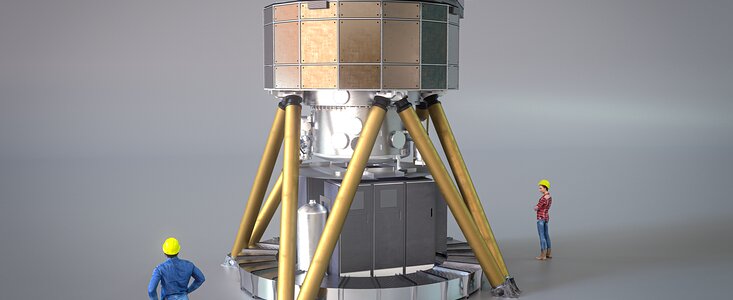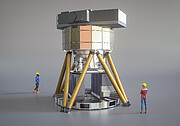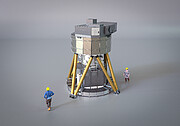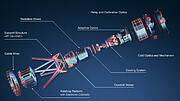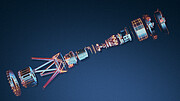Meddelande
ESO:s MICADO-instrument passerar sista designgranskningen
3 september 2024
Multi-AO Imaging Camera for Deep Observations (MICADO), den kraftfulla högupplösta kameran för ESO:s Extremely Large Telescope (ELT), har klarat sin slutliga designgranskning, vilket markerar en viktig milstolpe på vägen till drift senare detta decennium. När det är klart kommer MICADO att erbjuda astronomer möjligheten att ta bilder av universum med ett aldrig tidigare skådat djup.
Syftet med denna sista del av den slutliga designgranskningen (FDR) var att sammanfatta designprocessen som nu har pågått i flera år. Även om tillverkningen vanligtvis börjar först efter att FDR har godkänts, gavs grönt ljus för tillverkning av många av dess komponenter och delsystem redan tidigare, för att möjliggöra för MICADO-projektet att fortsätta framåt mot ELT:s första observationer. För att slutföra designgranskningen arbetade medlemmar i konsortiet med ESO-personal för att klargöra de återstående öppna frågorna om instrumentdesignen. Passerandet av denna milstolpe kommer att göra det möjligt för MICADO-konsortiet – en grupp på 150 personer spridda över sex länder – att nu fokusera fullt ut på tillverkning och testning av instrumentet.
Designen av MICADO har drivits av en önskan om ultrahög precision och stabilitet för att uppnå erforderlig hög känslighet, upplösning, astrometriska noggrannhet och täckning med stort våglängdsomfång. För att uppnå detta i ELT-miljön kommer MICADO att monteras ovanför instrumentplattformen så att ljuset från teleskopet kan vidarebefordras både till det adaptiva optiksystemet, som korrigerar den atmosfäriska turbulensen, och in i kryostaten. Här hålls optiken och detektorerna kalla så att de kan arbeta effektivt vid nära-infraröda våglängder utan störningar från andra värmekällor. Instrumentets detaljerade funktion styrs av elektronik som huvudsakligen är monterad precis under instrumentet och programvara kommer att tillåta användarna att utföra sina observationer på distans.
Denna sofistikerade design gör det möjligt för MICADO att ta högupplösta bilder av universum som avslöjar de detaljerade strukturerna och bildningsmekanismerna i avlägsna galaxer och gör det möjligt för astronomer att studera enskilda stjärnor och stjärnsystem i närliggande galaxer såväl som planeter och planetbildning bortom vårt solsystem. Dessutom kommer MICADO att fungera som ett unikt kraftfullt verktyg för att utforska miljöer där gravitationskrafterna är extremt starka, till exempel nära det supermassiva svarta hålet i mitten av vår galax, Vintergatan.
Efter några års observationer kommer MICADO:s kapacitet att förbättras genom att koppla den till Multiconjugate Adaptive Optics Relay For ELT Observations (MORFEO). Detta instrument gör att MICADO kan ta skarpare bilder över ett större synfält.
För en fullständig sammanfattning av vem som byggde MICADO, hur instrumentet fungerar och hur det kommer att avslöja universum som vi aldrig sett det förut, se "Möt MICADO, en superkamera för ELT!"
Mer information
MICADO-konsortiet utgörs avf MPE (Max-Planck-Institut für Extraterrestrische Physik, Tyskland), MPIA (Max-Planck-Institut für Astronomie, Tyskland), USM (Universitäts-Sternwarte München, Germany), IAG (Institute for Astrophysics of the Georg-August-Universität Göttingen, Tyskland), NOVA (Netherlands Research School for Astronomy represented by the University of Groningen, the University of Leiden, and the NOVA optical/infrared instrumentation group based at ASTRON in Dwingeloo, Nederländerna), INAF Istituto Nazionale di Astrofisica, CNRS/INSU (Centre National de la Recherche Scientifique/Institut National des Sciences de l’Univers represented by LESIA, GEPI, Division Technique de l'INSU, UTINAM/OSU THETA, LCF and IP2I/LMA, Frankrike), A* (an Austrian partnership represented by the University of Vienna, the University of Innsbruck, the University of Linz, and RICAM Linz, Austrian Academy of Sciences, Österrike), och Finnish Centre for Astronomy with ESO (FINCA), University of Turku, Finland.
Den primära rollen för varje konsortiepartner beskrivs i https://www.mpe.mpg.de/ir/micado.
Länkar
Om meddelandet
| ID: | ann24013 |
Our use of Cookies
We use cookies that are essential for accessing our websites and using our services. We also use cookies to analyse, measure and improve our websites’ performance, to enable content sharing via social media and to display media content hosted on third-party platforms.
ESO Cookies Policy
The European Organisation for Astronomical Research in the Southern Hemisphere (ESO) is the pre-eminent intergovernmental science and technology organisation in astronomy. It carries out an ambitious programme focused on the design, construction and operation of powerful ground-based observing facilities for astronomy.
This Cookies Policy is intended to provide clarity by outlining the cookies used on the ESO public websites, their functions, the options you have for controlling them, and the ways you can contact us for additional details.
What are cookies?
Cookies are small pieces of data stored on your device by websites you visit. They serve various purposes, such as remembering login credentials and preferences and enhance your browsing experience.
Categories of cookies we use
Essential cookies (always active): These cookies are strictly necessary for the proper functioning of our website. Without these cookies, the website cannot operate correctly, and certain services, such as logging in or accessing secure areas, may not be available; because they are essential for the website’s operation, they cannot be disabled.
Functional Cookies: These cookies enhance your browsing experience by enabling additional features and personalization, such as remembering your preferences and settings. While not strictly necessary for the website to function, they improve usability and convenience; these cookies are only placed if you provide your consent.
Analytics cookies: These cookies collect information about how visitors interact with our website, such as which pages are visited most often and how users navigate the site. This data helps us improve website performance, optimize content, and enhance the user experience; these cookies are only placed if you provide your consent. We use the following analytics cookies.
Matomo Cookies:
This website uses Matomo (formerly Piwik), an open source software which enables the statistical analysis of website visits. Matomo uses cookies (text files) which are saved on your computer and which allow us to analyze how you use our website. The website user information generated by the cookies will only be saved on the servers of our IT Department. We use this information to analyze www.eso.org visits and to prepare reports on website activities. These data will not be disclosed to third parties.
On behalf of ESO, Matomo will use this information for the purpose of evaluating your use of the website, compiling reports on website activity and providing other services relating to website activity and internet usage.
Matomo cookies settings:
Additional Third-party cookies on ESO websites: some of our pages display content from external providers, e.g. YouTube.
Such third-party services are outside of ESO control and may, at any time, change their terms of service, use of cookies, etc.
YouTube: Some videos on the ESO website are embedded from ESO’s official YouTube channel. We have enabled YouTube’s privacy-enhanced mode, meaning that no cookies are set unless the user actively clicks on the video to play it. Additionally, in this mode, YouTube does not store any personally identifiable cookie data for embedded video playbacks. For more details, please refer to YouTube’s embedding videos information page.
Cookies can also be classified based on the following elements.
Regarding the domain, there are:
- First-party cookies, set by the website you are currently visiting. They are stored by the same domain that you are browsing and are used to enhance your experience on that site;
- Third-party cookies, set by a domain other than the one you are currently visiting.
As for their duration, cookies can be:
- Browser-session cookies, which are deleted when the user closes the browser;
- Stored cookies, which stay on the user's device for a predetermined period of time.
How to manage cookies
Cookie settings: You can modify your cookie choices for the ESO webpages at any time by clicking on the link Cookie settings at the bottom of any page.
In your browser: If you wish to delete cookies or instruct your browser to delete or block cookies by default, please visit the help pages of your browser:
Please be aware that if you delete or decline cookies, certain functionalities of our website may be not be available and your browsing experience may be affected.
You can set most browsers to prevent any cookies being placed on your device, but you may then have to manually adjust some preferences every time you visit a site/page. And some services and functionalities may not work properly at all (e.g. profile logging-in, shop check out).
Updates to the ESO Cookies Policy
The ESO Cookies Policy may be subject to future updates, which will be made available on this page.
Additional information
For any queries related to cookies, please contact: pdprATesoDOTorg.
As ESO public webpages are managed by our Department of Communication, your questions will be dealt with the support of the said Department.
